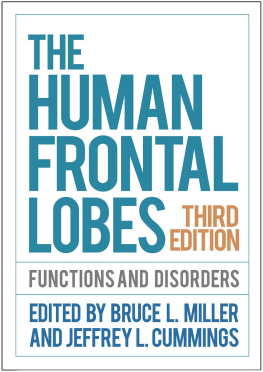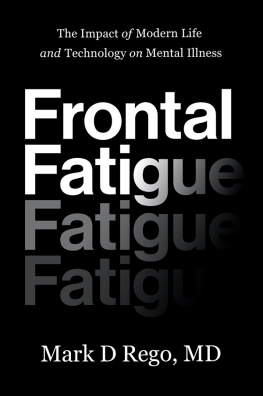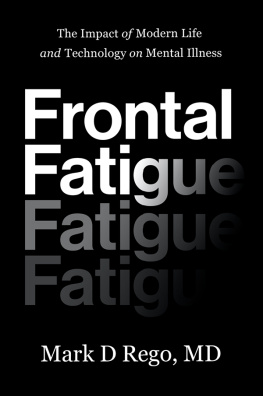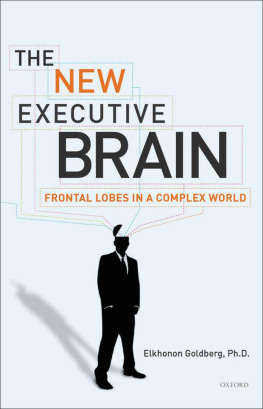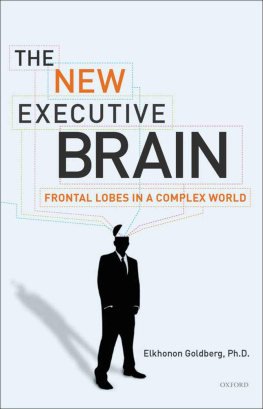FrontalSubcortical Circuits in Psychiatric and Neurological Disorders
Edited by David G. Lichter and Jeffrey L. Cummings
THE HUMAN FRONTAL LOBES
FUNCTIONS AND DISORDERS
Third Edition
EDITED BY
Bruce L. Miller
Jeffrey L. Cummings

THE GUILFORD PRESS
New York London
Epub Edition ISBN: 9781462531851; Kindle Edition ISBN: 9781462531868
Copyright 2018 The Guilford Press
A Division of Guilford Publications, Inc.
370 Seventh Avenue, Suite 1200, New York, NY 10001
www.guilford.com
All rights reserved
No part of this book may be reproduced, translated, stored in a retrieval system, or transmitted, in any form or by any means, electronic, mechanical, photocopying, microfilming, recording, or otherwise, without written permission from the publisher.
Last digit is print number: 9 8 7 6 5 4 3 2 1
Library of Congress Cataloging-in-Publication Data Names: Miller, Bruce L., 1949 editor. | Cummings, Jeffrey L., 1948 editor.
Title: The human frontal lobes : functions and disorders / edited by Bruce L. Miller, Jeffrey L. Cummings.
Description: Third edition. | New York : The Guilford Press, [2018] | Includes bibliographical references and index.
Identifiers: LCCN 2017028933 | ISBN 9781462531837 (hardback) Subjects: LCSH: Frontal lobesPhysiology. | Frontal lobesPathophysiology. | BISAC: PSYCHOLOGY / Neuropsychology. | MEDICAL Psychiatry General. | PSYCHOLOGY Psychopathology General. | MEDICAL / Neuroscience.
Classification: LCC QP382.F7 H85 2018 | DDC 612.8/25dc23
LC record available at https://lccn.loc.gov/2017028933
Bruce L. Miller, MD, is the A. W. and Mary Margaret Clausen Distinguished Professor of Neurology at the University of California, San Francisco (UCSF), and Director of the UCSF Memory and Aging Center. Dr. Miller is a behavioral neurologist focused on dementia, with special interests in brainbehavior relationships as well as the genetic and molecular underpinnings of disease. He currently conducts research on frontotemporal dementia, oversees a program on healthy aging, and helps lead two privately funded research consortia. Dr. Miller is a recipient of the Potamkin Prize from the American Academy of Neurology, the Raymond D. Adams Lectureship from the American Neurological Association, the J. Elliot Royer Award from the San Francisco Neurological Society, the UCSF Annual Faculty Research Lectureship in Clinical Science, and the Gene D. Cohen Research Award in Creativity and Aging from the National Center for Creative Aging, among many other honors. With more than 700 scientific publications, Dr. Miller has served since 1984 as Scientific Director of the John Douglas French Alzheimers Foundation. He is a member of the National Academy of Medicine.
Jeffrey L. Cummings, MD, ScD, is Director of the Cleveland Clinic Lou Ruvo Center for Brain Health in Las Vegas, Nevada, and Cleveland, Ohio. He is the Camille and Larry Ruvo Chair for Brain Health at the Cleveland Clinic Neurological Institute and Professor of Medicine at the Cleveland Clinic Lerner College of Medicine of Case Western Reserve University. A leading authority on Alzheimers disease, Dr. Cummings is interested in clinical trials, developing new therapies for brain diseases, and the interface of neuroscience and society. He is a recipient of the Edward Henderson Award from the American Geriatrics Society, the Research Award from the John Douglas French Alzheimers Foundation, the Ronald and Nancy Reagan Research Institute Award from the Alzheimers Association, the Distinguished Scientist Award from the American Association for Geriatric Psychiatry, and the Lifetime Achievement Award from the Society for Behavioral and Cognitive Neurology, among many other honors. Dr. Cummings has more than 700 scientific publications and is a past president of the Behavioral Neurology Society and the American Neuropsychiatric Association.
Judith Aharon-Peretz, MD, Cognitive Neurology Unit, Rambam Health Care Campus, Haifa, Israel
Jee Bang, MD, Department of Neurology, Johns Hopkins University School of Medicine, Baltimore, Maryland
Sarah J. Banks, PhD, Lou Ruvo Center for Brain Health, Cleveland Clinic, Las Vegas, Nevada
James R. Bateman, MD, Department of Neurology, University of Colorado School of Medicine, Aurora, Colorado
Brianne M. Bettcher, PhD, Departments of Neurosurgery and Neurology, University of Colorado School of Medicine, Aurora, Colorado Antonello Bonci, MD, National Institute on Drug Abuse, Bethesda, Maryland; Solomon H. Snyder Department of Neuroscience, Johns Hopkins University School of Medicine, Baltimore, Maryland Kyle Brauer Boone, PhD, California School of Forensic Studies, Alliant International University, and Department of Psychiatry and Biobehavioral Sciences, University of California, Los Angeles, Los Angeles, California Nigel J. Cairns, PhD, Department of Neurology, Washington University School of Medicine, St. Louis, Missouri
Billy T. Chen, PhD, Corporate Development, Ionis Pharmaceuticals, Inc., Carlsbad, California
Winston Chiong, MD, PhD, Memory and Aging Center, Department of Neurology, University of California, San Francisco, San Francisco, California Helena C. Chui, MD, Department of Neurology, Keck School of Medicine, University of Southern California, Los Angeles, California Julia Chung, MD, Department of Psychiatry and Biobehavioral Sciences, HarborUCLA Medical Center, Torrance, California Jeffrey L. Cummings, MD, Lou Ruvo Center for Brain Health, Cleveland Clinic, Las Vegas, Nevada
Mary G. De May, MD, Memory and Aging Center, Department of Neurology, University of California, San Francisco, San Francisco, California Mark DEsposito, MD, Department of Psychology, University of California, Berkeley, Berkeley, California
Orrin Devinsky, MD, Department of Neurology, New York University School of Medicine, New York, New York Nicholas B. Diamond, MA, Department of Psychology, University of Toronto, and Rotman Research Institute, Baycrest, Toronto, Ontario, Canada Darin D. Dougherty, MD, Department of Psychiatry, Massachusetts General Hospital and Harvard Medical School, Belmont, Massachusetts Simon Ducharme, MD, Department of Psychiatry, McGill University Health Centre, McGill University, Montral, Qubec, Canada Annette L. Ermshar, PhD, Dr. Ermshar and Associates, San Marino, California
Christopher M. Filley, MD, Departments of Neurology and Psychiatry, University of Colorado School of Medicine, Aurora, Colorado Daniel Fulford, PhD, Department of Psychological and Brain Sciences, Boston University, Boston, Massachusetts
Adam Gazzaley, MD, Department of Neurology, University of California, San Francisco, San Francisco, California Daniel H. Geschwind, MD, PhD, Department of Neurology, University of California, Los Angeles, Los Angeles, California Kelly Gola, PhD, Memory and Aging Center, Department of Neurology, University of California, San Francisco, San Francisco, California Marls Gonzlez-Fernndez, MD, PhD, Department of Physical Medicine and Rehabilitation, Johns Hopkins University School of Medicine, Baltimore, Maryland Maria Luisa Gorno-Tempini, MD, Memory and Aging Center, Department of Neurology, University of California, San Francisco, San Francisco, California Lea Tenenholz Grinberg, MD, Memory and Aging Center, Department of Neurology, University of California, San Francisco, San Francisco, California
Next page
